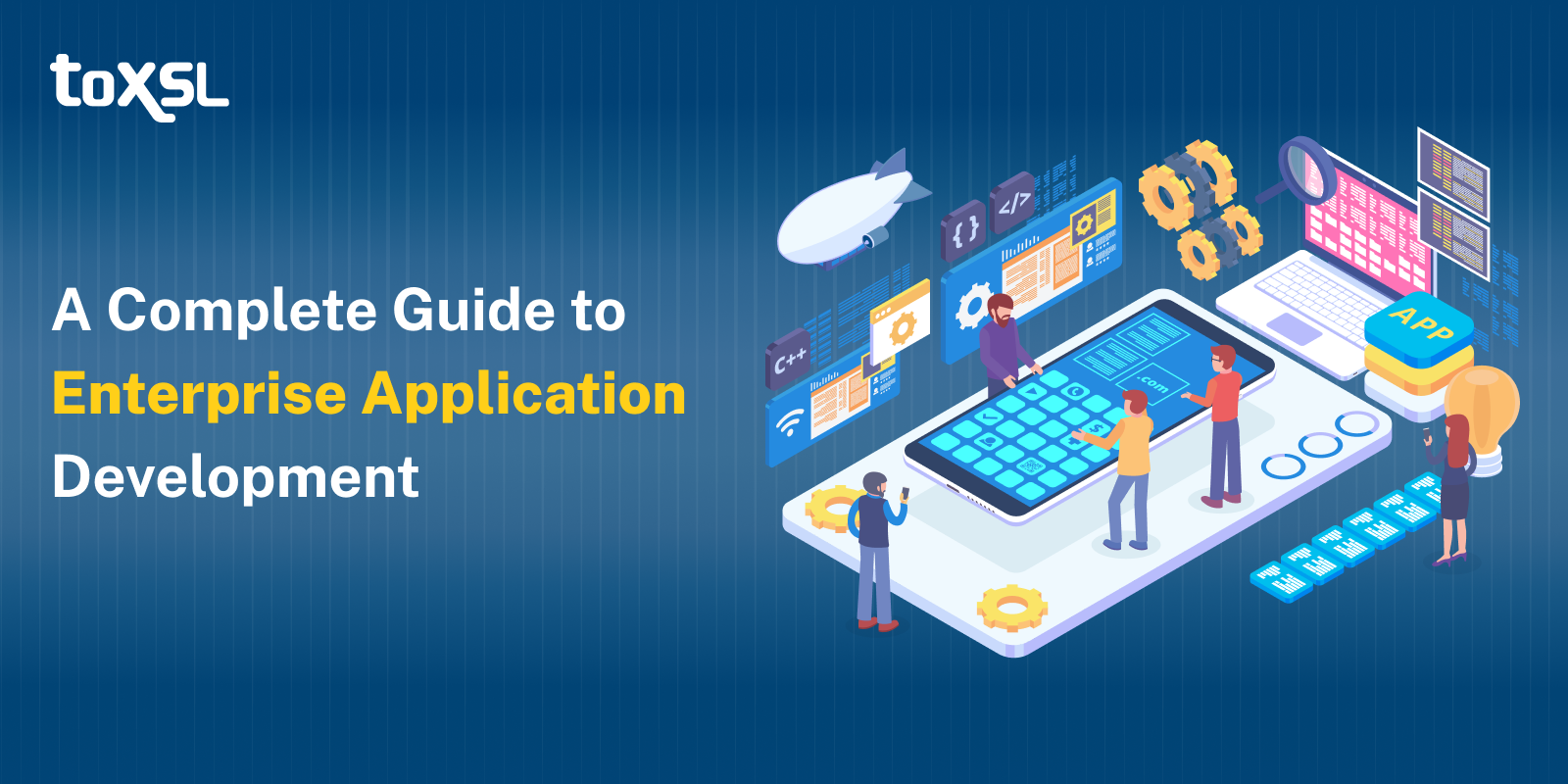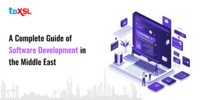- Nov 21, 2024
Share this post on:

Are you looking to develop enterprise app that will help you solve customer problems and cater to their individual needs? Enterprise apps help businesses solve complex business problems. According to statista, the global enterprise market size is estimated to reach $480.75 billion by the year 2032. These apps provides huge data streams to businesses that help them grow.
Enterprise application development is a process of helping businesses meet the complex need of organizations by developing software applications. These applications are customized to meet various business requirements, including customer relationship management (CRM) and enterprise resource planing (ERP).
Steps to Enterprise Application Development
Let us now dive deeper into the blog and discuss the steps to development of an enterprise app. The development process is a challenging process and every business that is looking forward to enterprise app development must know the following development steps:
Requirements Gathering: This is the initial stage of any app development, and this helps businesses understand the needs of their business. This step includes gathering of business requirements, conducting interviews with stakeholders, analyzing and identifying key functionalities. This sets the foundation layer for the next stages of development.
Architecture Designing: After gathering the business requirements, the next step is to develop the architecture of enterprise application. In this step developers will define the structure, database design, and UI/UX. This will set a robust foundation for development of a secure and scalable enterprise application.
Development and Testing: This is one of the most crucial stages among all, as this is where development of enterprise app is done. Here the development team writes the code, integrates various components, and starts with the development part. Development team needs to follow best practices and use right frameworks and libraries. But is development enough? Well, no. Once the development process is complete, the app must undergo rigorous testing. The developed app must get tested for various use cases. This is done to check if the app developed is working well without any glitch, ensuring that app is ready to go for the next stage.
Deployment and Maintenance: Once the development and testing process is successfully completed, the enterprise app is deployed to the production environment. In this stage, developers sets up servers, configure databases, and make app live. It is then launched in the Play Store or Apple Store. This is where it becomes available for the users. After deployment, business need to check if the app is working fine. In case users face any issue while using the app, developers must resolve the issue as fast as they can. With this, app requires constant ongoing maintenance, including bug fixing, performance optimization, and more.
Also Read: Top Mobile App Development Trends and Beyond
Benefits of Enterprise Application Development
However, there is a lot of advancements happening in technology that continue to shape the landscape of enterprise application development. Among all the changes in tech, the benefits of enterprise app development cannot be overlooked. Businesses require powerful and scalable solutions to manage their operations, streamline processes, and stay ahead of the market. In this section, let us discuss the benefits of Enterprise Application Development:
Streamlined Processes: Enterprise applications help businesses streamline internal operations such as automating manual processes and eliminating paperwork. These apps enhance efficiency, reduce errors, and improve productivity.
Improved Decision Making: These apps offers real-time data, helping businesses make informed decisions. With this, your get access to the accurate information that help your management identify trends, opportunities, and resolve challenges effectively.
Enhanced Collaboration: Enterprise apps offer better ways to understand and serve customers. Organizations can share documents, manage tools, centralize communication channels, and whatnot. These apps foster teamwork and help teams share knowledge, helping them enhance collaboration.
Improved Customer Satisfaction: An organization runs smoothly with the help of enterprise apps such as CRM, helping businesses focus on their services and customers, helping them enhance customer satisfaction. This help them improve customer satisfaction and loyalty.
Competitive Advantage: A well-developed enterprise app offers businesses a competitive edge in the market. This enable them to stay ahead of competition, deliver high-quality customer experiences, and respond to the market demands.
How Much Does it Cost to Develop an Enterprise App?
The cost of developing an enterprise app is not fixed and varies as per business requirements. There are numerous factors on which the cost depend. However, let us look at the various cost ranges:
Small Apps: The cost of developing small apps ranges between $10,000 to $100,000, depending on the various business requirements. These apps have a limited functionalities, integrations, and user bases.
Medium Apps: The cost of development of medium apps ranges between $50,000 to $150,000, depending on business needs. However, these apps are moderately complex and support higher usage of robust features and security needs.
Complex Apps: These apps are developed using extensive custom programming and framework. Also, they require heavy integration, have big data capabilities, scalability, and undergoes rigorous testing processes. Hence, these apps are costly and starts from $150,000.
But this is not it. There are a few more factors that decides the cost of enterprise app development. They are:
• Features and functionality
• Number of user roles
• Level of customization
• Complexity of legacy systems
• Security requirements
• Data storage capacity
• Regular maintenance
What Are The Key Features of Enterprise Applications?
Enterprise applications offer various key features that identify them from other consumer apps. A few of the key features are as follows
Scalability and Flexibility: Do you want to have an app solution that can help you handle business workload smoothly? Enterprise applications are designed to handle increasing workloads and user demands while maintaining business performance. Scalability allows organizations to expand their operations seamlessly, accommodating growth in users, transactions, or data volume. Flexibility ensures that these applications can adapt to changing business processes and requirements, enabling customization and integration with other systems as needed.
Security and Data Protection: Security is crucial in enterprise applications as they manage sensitive data. These applications use robust security measures, including encryption, access controls, and authentication protocols, and protect businesses against unauthorized access and data breaches.
Integration Capabilities: Enterprise applications must integrate smoothly with existing systems and third-party services. This capability allows for streamlined workflows and data sharing across different departments or platforms. APIs (Application Programming Interfaces) are commonly used to facilitate these integrations, ensuring that disparate systems can communicate effectively.
User-friendly Interface: A user-friendly interface ensures that employees can utilize enterprise applications efficiently. Intuitive designs enhance user experience by minimizing the learning curve and enabling quick navigation through features. This improves productivity and reduces the likelihood of errors during operation.
Analytics and Reporting: Enterprise applications often include advanced analytics and reporting features that provide insights into business performance. These tools enable organizations to analyze data trends, generate reports, and make informed decisions based on real-time information. Effective analytics capabilities are essential for strategic planning and operational efficiency.
Mobile Accessibility: With the rise of remote work and mobile devices, enterprise applications increasingly offer mobile accessibility. This feature gives employees access to business operations from anywhere at any time. This in turn enhances flexibility and responsiveness.
Future Trends in Enterprise Application Development
Let us now learn about the future trends in enterprise application development.
Low-code and No-code Development: Low-code and no-code development platforms allow users to develop apps with minimum coding. These platforms allow developers to code fast and enhances collaboration, and eliminate the need of relying on traditional development cycles.
Artificial Intelligence: Artificial Intelligence and Machine Learning have gained popularity in today’s time. Using these technologies help businesses enhance their decision-making and efficiency.
Internet of Things: As a business expands, it needs to integrate its system with the increased number of connected devices. IoT enabled applications offers real-time data and enable remote monitoring.
Blockchain Technology: Blockchain technology help businesses store data and do transactions more securely and transparently. A few applications include supply chain management, identity verification, smart contracts and more.
How Can ToXSL Technologies Help You Leverage the Power of Enterprise Application Development?
ToXSL Technologies is a leading enterprise app development company, renowned for developing the best enterprise apps for the businesses globally. We have spent more than 12 years in business and helped them streamline their operations with the help of best enterprise solutions.
Our team of seasoned developers go through your business requirements first, and then we design and plan the development methodologies. Once approved from the higher management and clients we start with the development process. Moreover, we maintain transparency and communicate well with our clients during the entire development process, ensuring that we meet the entire client requirements. Additionally, we offer app maintenance services to ensure that your app runs smoothly after the launch.
So, if you are looking to streamline business with the help of best enterprise app development company, ToXSL Technologies is here to help. Get in touch with us today and let our developers help you take your business to the next level.









